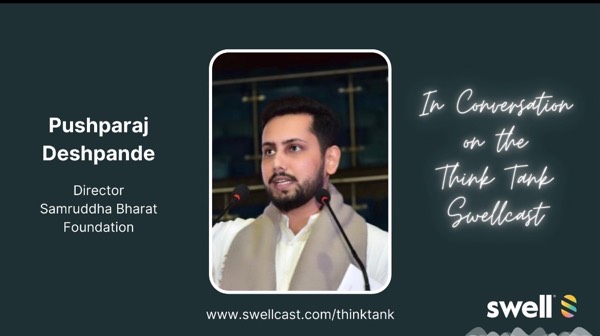
@ThinkTank · 2:09
Ideology and Politics: In Conversation with Pushparaj Deshpande
Going back to what I mentioned in the beginning, we're witnessing a number of shifts in ideology in India's political parties and society. But before we look at specific cases, can you give us a sense of what you see as the major change in the idea of India as we see it today
They are in some sense classified in time, clinging to old habits that address primarily the symbolic a token protest at Jantan Manta, or an open letter with a few hundred or even a few thousand signatures, a roundtable or a meeting in familiar haunts, a tweet or WhatsApp forward a walkout in Parliament, even a sporadic rally. These do not matter to those who are spearheading one end of this regressive political culture that has pre existed in India for a very long time

@ThinkTank · 1:14
But how do you see maybe the collective failure of India's progressive political parties? I mean, how would you place that in this context? And if I had to look at like a specific case, parties which were supposed to embody a progressive ideal have sort of shifted in their standpoints as well. And a case in point is that of the Congress Party of today. How do you view the sort of soft hindrate assertion which the party supposedly practices made by critics?
Karan. I must add that it is because these regressive parties and forces have leveraged the state to propagate a regressive ideology that the center of the policy has shifted right towards. And unlike Vajpai's tenure where Prime Minister Wajpai had to conduct himself according to the consensus that predated him, the heroican consensus, which is why he was characterized as the right man in the wrong party today

@ThinkTank · 0:43
You know, there's a common belief Pushparaj is that parties are driven solely by electoral compulsions. And therefore, if there are ideas out there which will serve this purpose or which will reap dividends, then it makes sense to we follow that path. But there's also a view that there is a silent majority out there in the voting population who would value the ideas of secularism and pluralism and all of these progressive thoughts that that are commonly discussed. But is this empirically true of lead?
It is not that the party I mean, any party that is willing to flirt with regressive, Orthodox tactics and customs in order to win wars, compromising is choosing the easy way out. And in doing that, they are compromising the Constitution idea of India. Now there is an alternative

@ThinkTank · 0:42
Very well said, Pushparaj. I think political opportunism is something that's becoming a common theme in this country. And that leads me to my next question. You know, this year in particular will be crucial for the Indian opposition. And if you take a look at what's happening in Punjab, the Abadi Party seems to be fighting this election quite aggressively
So that's the first thing the BJP has perfected this. In every state, in every state election that you go there are about 15 subcasts that actually electorally matter. The normal practice is that one dominant Subcast in Marashas in Andra and Telangana it was the redees. In Gujarat it was the Patels in Haryana is a jar seeks in Punjab one dominant cast along with two other communities. That is the basic electoral arithmetic that either the Congress Party or the regional parties used to work with
Right. So there are two elements to your question. One relates to factionism and the other relates to this current election. So I'll answer them in that manner. To the uninformed, factionalism is bad. That it. Why is the Congress Party or any other party not fighting in a cohesive manner? Please understand that there is no such thing as one political party. The Congress Party has 30 state units, right? Each state unit has about five or seven big leaders representing different regions
That has become a big issue because informal surveys suggest and reportedly the findings of the socioeconomics survey from 2011 suggest that OBC are beyond 50% and have 27% reservations right now. So that has become a big issue. And you know that there have been a number of sitting ministers from the BJP and Emilia's who have jumped shipped on the Eve of the elections and they're joining the Samajvadi party. So the Samajvadi party

@ThinkTank · 1:18
You know, Bush Praj, I think public discourse has become quite my OPIC in this country and in other parts of the world as well, especially in the last few years. So therefore, it's kind of unimaginable to think of life five years down the line or ten years down the line. But if I have had to ask you to sort of paint us a picture, this is not the best case scenario. But if you had to extrapolate, what do you think might likely happen?
That's a really, really good question. World war. There has been a Democratic regression of thoughts and an attack on the established values that various countries stood for. This has happened in the United States, in the UK, in Hungary, in Turkey, certainly in India, and existing establishment parties, progressive forces have not really been able to tackle this, which is why the madness seems to be just increasing
This would mean escalating the normative and ideological battle that we find ourselves in beyond the centers of resistance that cropped up, whether the Shahimba or Japan mother or Azad Madean or Singhu border or whatever it is. It would mean evolving new ways to capitalize on the momentum that farmers, students, minority protests, and move from these sites of resistance into the homes. We need to convince. When I say we, I mean progressive forces. We need to especially convince those who do not subscribe to liberalism and secularism
Frankly, Karan, everyone, including you or anyone who is listening to this, has to understand that we are all political beings. All of us are affected by what is happening today. And all of us have a stake in fixing it. We can't keep outsourcing the fixing of India, the leadership of India to others. We have to stop. We have to pick up the mantle and do what needs to be done

@ThinkTank · 0:47
I'm going to take a deeper look at that, and we'll come back to you with a lot of questions, I'm sure. So thanks again for taking the time out to connect with me on Swell. And we'll be back with you very soon on the thing. Thanks for Cast. Good evening, and thanks again
